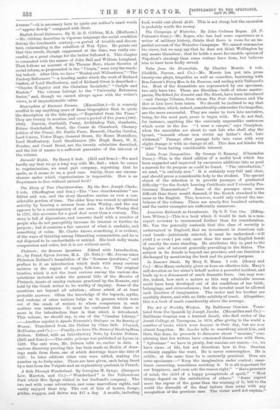English Social Reformers. By R. de B. Gibbins, M.A. (Methuen.)
—Mr. Gibbins describes in vigorous language the social condition during the fourteenth century,—a period of trouble and discon- tent, culminating in the rebellion of Wat Tyler. He points out that this revolt, though suppressed at the time, was really suc- cessful, as a great change for the better followed it. This chapter is connected with the names of John Ball and William Langland. Then follows an account of Sir Thomas More, whose theories of social reform, as propounded in the " Utopia," were very far-reach- ing indeed. After this, we have " Wesley and Wilberforce," " The Factory Reformers "—a heading under which the work of Richard Oasker, of Lord Shaftesbury, and of Richard Owen is described- " Charles Kingsley and the Christian Socialists," " Carlyle and Ruskin." The volume belongs to the " University Extension Series," and, though we cannot always agree with the writer's views, is of unquestionable value.


















































 Previous page
Previous page